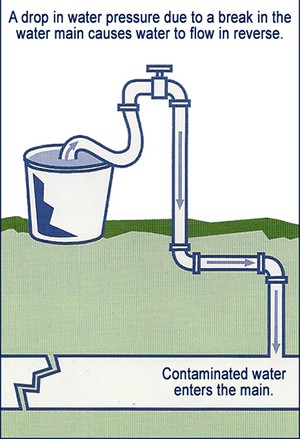Illegal connections
There are cases in Ethiopia and many other places of people illegally tapping into a water main in order to obtain water without paying for it. The cost of the water they use is borne by others who do pay for the water produced by the utility. Apart from committing a crime (theft of water, thus depriving the water utility of revenue), people who make illegal connections to the water supply system also endanger the safety of the mains water through possible contamination. This can be caused simply by making a break in the pipe without taking the necessary precautions to prevent contamination. The same can also happen if the illegal connection consists of a hose or pipe that, at one end, is connected to the water main and, at the other end, is left immersed below the water level of a storage tank, bucket or other container. This situation is illustrated in Figure 7.8. If there is a reduction in water pressure in the water main (say, due to a pipe burst), water from the container could be drawn into the mains supply. This phenomenon is referred to as back-siphonage. If the water in the bucket is contaminated in any way, this will result in contamination of the mains water too.

Figure 7.7 Back-siphonage.
Illegal connections mainly occur in newly established residential areas where some of the newly built households are supplied with water from the mains, while others do not have a piped supply. They get water from their neighbours through illegal connections using water hoses or plastic and metal pipes, without the knowledge and authorisation of the water utility.